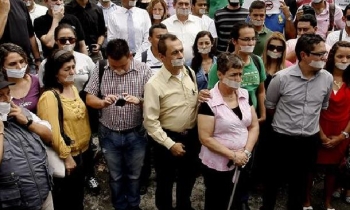Over the last few weeks, the media have given the Katrina disaster the special treatment reserved for Ultra-Mega-Double-Select Topic-A stories. You've read the massive headlines and gaped at the photo spreads of New Orleans under water. You've watched as the television banners evolved from "DEVASTATION IN THE GULF" (CBS) to "ROAD TO RECOVERY" (CNN). You've heard the theme music.
And as the Gulf coverage has taken over vast swaths of the media landscape, you've gotten the message: This is one of those stories that come along once in a lifetime and change everything -- history, economics, politics, life-as-we-know-it.
There's nothing obviously wrong here. Katrina is an epic disaster. If any story merits wall-to-wall coverage, this one does. Journalism is all about transforming the most amazing events in the world into theater, a show that draws people in and makes them care. In today's news environment -- where, even as the number of outlets grows, the range of interests seems to be narrowing -- sometimes there's just one big show playing, and it comes at us on the cultural equivalent of an IMAX screen, overwhelming everything else.
At the start of the John Roberts confirmation hearings, more than a few commentators noted that the hurricane had unseated the story widely touted beforehand as the likely defining moment of President Bush's second term. As CNN's Jeff Greenfield put it this week, Katrina made the Roberts nomination "the No. 2 story instead of the No. 1."
This hierarchy is brutal and very real, and it defines our communal existence. It also has a built-in weakness: After a story achieves No. 1 status, its superiority becomes its chief value. Initially, when a gigantic story breaks, we care about it on its own terms. The substance of the news arrests us and makes us want to know more.
But once a mega-story has been around for a bit, substance alone isn't enough. Life is hectic, and if you don't have a direct personal connection to a story, it's hard to sustain the intensity. There are only so many images of a flooded New Orleans that you can shake your head at, only so many stories of death and suffering, heroism and redemption, you can absorb.
Thus, at a certain point in one of these stories, the substance recedes and the status of the story becomes paramount. You care about Katrina because it's the biggest thing on the planet, and you will continue caring about it as long as the media assure you it's No. 1, and not a moment longer.
This cycle happens subtly, but it has major implications. Since the media's attention span is a mirror, more or less, of the public's own interest level -- as reflected in ratings and other audience feedback -- mega-stories have an inevitable life cycle. Once such a story has passed into the zone where it's surviving on its own hugeness, once the initial frenzy is over and the Nielsens are starting to crack, it's only a matter of time before another big story comes along and supplants it. And since the status of the first story has by now become its chief strength, once a new No. 1 has taken the throne, that older story effectively disappears -- poof, kaput, dust.
It doesn't really disappear. But the part of the brain that makes decisions about attention and engagement notes the absence of media intensity and concludes, quite logically, that that story is over. The media pile-on has become its own undoing.
Remember THE TSUNAMI? THE LONDON BOMBINGS? Those stories didn't happen very long ago. And each was, for a while, the biggest, most breathtaking thing imaginable, beneficiary of all the energy and resources the news business can muster. Each had legions of reporters, urgent moment-by-moment updates, special reports, chyrons, and all the rest.
And each is now ... well, not forgotten, but in the harried mind of the average news consumer, a pretty distant memory. How could they not be, when you've got DEVASTATION IN THE GULF playing constantly on a screen near you?
Maybe there's nothing wrong with this. News ebbs and flows, and every story must eventually wind down. Still, there's a way in which the mega-story system robs major stories of their natural arc, and often disappears them before we should really be done with them. Tens of thousands die in a tsunami and we care passionately about the story for a month or so -- until it runs off a cliff?
There's a widespread assumption that, as the TV news networks decline, we no longer experience the news collectively. But in another sense, we experience it more collectively than ever -- perhaps too collectively, jumping from story to story en masse in these ungainly leaps, never looking back.
"Will the reporters sustain their outrage?" Village Voice media critic Sydney Schanberg wondered this week in a column about the Gulf coverage.
Never mind outrage -- just sustaining intense media interest will be a feat. Earlier this week, reports began to come in that the Katrina death toll might not approach the numbers originally feared. The Roberts hearings didn't capture the flag, but they made a decent showing. By midweek, you started to feel the media coughing and edging ever so slightly toward the door, preparing already for the moment when they'll see Katrina off. Leaving so soon?
William Powers is a columnist for National Journal magazine, where "Off Message" appears. His e-mail address is bpowers@nationaljournal.com.









